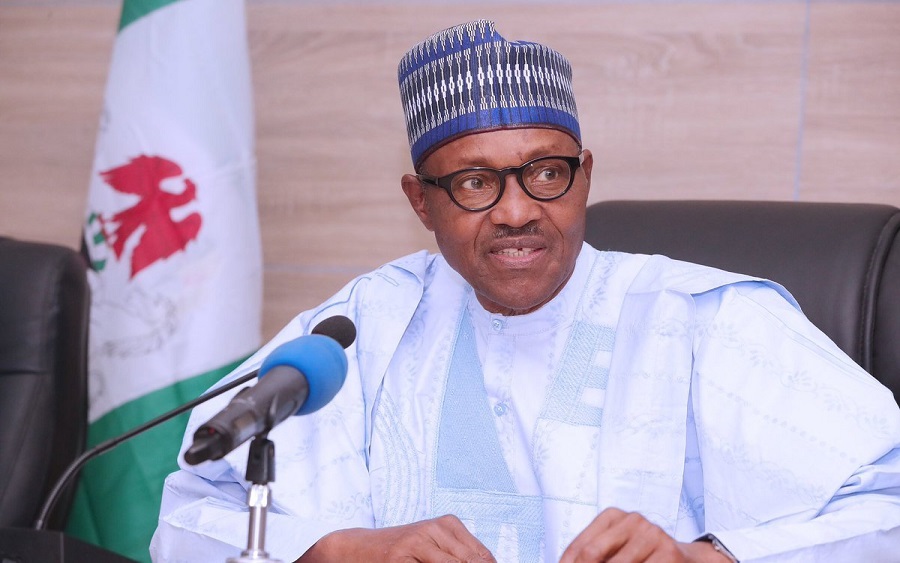President Muhammadu Buhari, on Tuesday, flagged off the construction of the $10 billion Nigeria Liquefied Natural Gas (NLNG) train 7 project, asking for timely completion of the project.
Buhari, who performed the inauguration virtually from the Presidential Villa Abuja, said the early completion of the project located in Bonny Island, Rivers State, would see to the commencement of Train 8.
The President, while speaking during the groundbreaking ceremony, urged the Board of Directors, Management and Staff of NLNG, the host communities, the Rivers State Government, and other agencies of the Federal Government to continue to collaborate and ensure that the completion and eventual commissioning of the Train 7 project would be safe and on time.
READ: Bonny Island benefitted $30 billion in gas investments, NLNG boss reveals
What President Buhari is saying about NLNG Train 7
Buhari said, ”As we flag off the Train 7 project today, I look forward to the development and execution of more gas projects by the International Oil Companies (IOCs) and indigenous operators, and more Trains from NLNG to harness the over 600 trillion cubic feet of proven gas reserves we are endowed with.
”Let me use this opportunity to commend the shareholders of NLNG, the Federal Ministry of Petroleum, NNPC and the NCDMB and other stakeholders for very exemplary collaboration which has culminated in this great opportunity for Train 7.
“I want to thank the foreign investors for the confidence reposed in Nigeria, and assure all Nigerians and potential investors in the Oil and Gas sector that the Federal Government will continue to create the enabling environment in order to develop the sector and bring the full benefits of Gas closer to our people.’’
READ: NLNG, Total Gas & Power sign 10-year sales deal
While reminiscing on the history of the NLNG, Buhari said that he had been passionately associated with the project during the formative years.
He said, “As Minister of Petroleum Resources, I kicked off our first foray in LNG Business in 1978. At the time it was already apparent that Nigeria was mainly a gas-rich country with little oil.
“It, therefore, gives me great joy to see the organization transform from just a project in the early 90s to a very successful company with over 20 years of responsible operations and a steady supply of Liquefied Natural Gas, Liquefied Petroleum Gas and Natural Gas Liquids into the global market.
”This is proof that Nigeria has a great capacity to deliver value to the world by harnessing our natural resources.’’
READ: The Israeli-Palestine conflict and its impact on energy security
In his address, the Minister of State for Petroleum Resources, Timipre Sylva, described NLNG as a blessing to the nation, noting that it had positively complemented crude oil exploration by monetising flared gas and yielding huge revenue to the nation and investors.
He said, “I boldly say that the groundbreaking of Train 7 is a guarantee to every stakeholder of more dividends in terms of further reduction in gas flaring, more revenue to the nation and shareholders, more job opportunities especially at the construction phase and more social investments for the society.’’
Also speaking, Anthony Attah, the Managing Director and Chief Executive Officer of NLNG, said Train 7 would increase NLNG’s overall capacity to 30 million tonnes per annum (mtpa) from the current 22 million mtpa, while further adding immense value to the nation and the people.
Attah noted that the project would stimulate the inflow of about $10 billion FDI into Nigeria, create 12,000 direct jobs in Bonny Island and additional 40,000 indirect construction jobs.
What you should know
- The NLNG is jointly owned by the Federal Government, represented by the Nigerian National Petroleum Corporation (49%), and three international oil companies, namely Shell (25.6%), Total (15%) and Eni (10.4%).
- The Train 7 project, which had been delayed for over 10 years, aims to increase the company’s production capacity from 22 metric tonnes per annum to about 30 MTPA, and will form part of the investment of over $10bn including the upstream scope of the LNG value chain.
- The NLNG has generated $114 billion in revenues over the years, paid $9 billion in taxes; $18 billion in dividends to the Federal Government and $15 billion in feed gas purchase.












Please did you say the production capacity is 22 metric tons per annum?